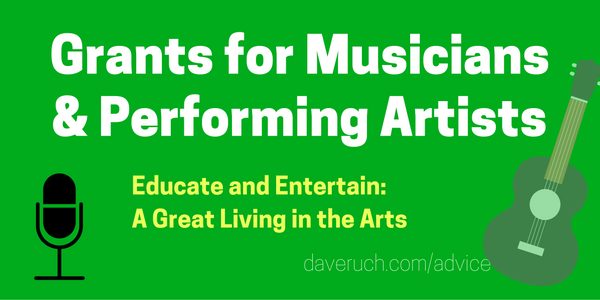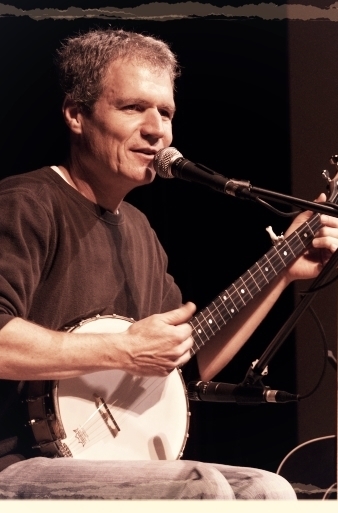Grant funding has been absolutely central to my income as a performer for the past 25 years, and it’s something I get asked about frequently by musicians, artists, and subscribers to this blog.
And YES, grant funds are available right now in spite of COVID-19 shutdowns!
Today, I’m going to share two ridiculously easy keys to submitting successful grant applications.
(Not sure where to find grants, and what kinds of work can be funded? We recently had two detailed webinars on the topic – you can get access to the content right here.)
 I’ve written quite a few grants over the years to fund my own work, and have been written into lots of other grants as a performing artist, and I can tell you that these two items can make or break your chances of getting funded.
I’ve written quite a few grants over the years to fund my own work, and have been written into lots of other grants as a performing artist, and I can tell you that these two items can make or break your chances of getting funded.
Step #1 – F0llow the Instructions
Seriously.
As simple as that sounds, I’ve been told by grant administrators that the vast majority of applicants do NOT do this well enough, and the ones that don’t follow the instructions to a “T” are eliminated from consideration.
Immediately.
No matter how good their art or their project is.
Things to make sure you get right:
- do you meet the grant eligibility requirements?
- read and re-read the goals of the grant so you can speak directly to them
- read and re-read each question to make sure you’re providing the answers they want
- write with the assumption that they know nothing about you or your artwork
- provide every support material they ask for (samples of your work, how you plan to publicize the event, etc)
- does your budget add up? Triple check it.
- no typos!
“Don’t assume that whoever is reading knows who you are and knows your work – start from scratch and explain EVERYTHING. The more, the better. Don’t undersell yourself.”
– Jen Swan, Arts Services Inc. of Western New York
Further reading: check out the article Dear Artists, Stop Turning in Bad Grant Applications
Step #2 – Talk to the Granting Organization
Again, seemingly obvious, but too many applicants aren’t reaching out to the organization that’s administering the grant to ask for advice and guidance.
 My experience has been that the people in charge of disseminating grant funds really want to help us give them strong applications.
My experience has been that the people in charge of disseminating grant funds really want to help us give them strong applications.
Call or email the grant officer to ask for a face-to-face meeting, or see if you can run a draft of your application past them for their feedback before you submit it.
The benefits?
- they know what makes a strong application, and where other applicants have failed in the past
- they know what the decision makers are looking for, including factors that might not be obvious to us
- it demonstrates your commitment to getting things “right”
- it gives you the opportunity to explain your project – and convey your enthusiasm – in person, putting a face to your application
- helps deepen your relationship with the granting organization, which is really useful for future opportunities
“If our artists are submitting to a national grant, they are welcome to send us a copy and we’ll review and give feedback as part of our mission to support them.”
– Shannon Linker, Arts Council of Indianapolis
Step #3 (BONUS) – Don’t Skim This Article!
Did you just skim the main points of this article and find them to be pretty obvious?
Unhelpful, even?
Here’s the deal – – there is grant money out there to support worthwhile music and performance projects, and that money is given out to successful applicants every year, even during COVID.
 I urge you to read this whole thing again (it’s not that long…), and take these two items to heart.
I urge you to read this whole thing again (it’s not that long…), and take these two items to heart.
They really are key pieces of the puzzle.
Want to Find Grants?
We recently had two live webinars to teach the “A-B-C’s” of grant funding for musicians and performing artists. Replay videos of those trainings are now available for purchase.
Here’s what we covered:
- how to find grants
- what can be funded
- ways to make yourself eligible
- what the grantors want
- budgeting and pricing your work
- how to submit a powerhouse application
- PLUS, we took a private look inside a successfully funded grant application
Get access to the replay videos right here.
About The Blog
 Since leaving a white-collar marketing job in 1992, Dave Ruch has been educating and entertaining full-time in schools, historical societies and museums, folk music and concert venues, libraries, and online via distance learning programs.
Since leaving a white-collar marketing job in 1992, Dave Ruch has been educating and entertaining full-time in schools, historical societies and museums, folk music and concert venues, libraries, and online via distance learning programs.
Along the way, he’s learned a great deal about supporting a family of four as a musician.
The Educate and Entertain blog provides articles, tips, encouragements, and how-to’s for regional performers (in any region) interested in making a great full-time living in the arts.


Hi Dave! OMG just found your site via TAG and I’m just soaking it up. I didn’t even know that the title Teaching Artist existed until a year or so ago, and I’m so hungry to connect with others on the same path, and to learn how to be more effective at getting my work out into the world.
I started a nonprofit in early 2020 because funding always seemed to be the roadblock- everyone is enthusiastic about the program but they can barely afford pencils, right?? I also want to be able to bring my program into under-served communities as much as possible- everyone deserves art and joy!
My question is, what is your status in order to apply for grants? Did you go full-on 501c3, or do you have a fiscal sponsor or group exemption? OR, and I’ve been considering this lately, are you able to apply on behalf of public schools who already have that status? Or some other way? Have you noticed discrepancies between one or another of these options? I currently have a group exemption through Folk Alliance which will allow me to pursue certain grants. Just curious how you went about it yourself.
Thank you so much, I am gong to buy all your things :).
Be well,
Leslie
Hi Leslie – glad you found your way here to the blog. I explored creating a 501c3 some years ago but decided against it due to the red tape and added administrative load. All of the grants I’ve been a part of have either been written by myself (grants for individual artists), written by non-profits in order to hire me, or written by me on behalf of schools and presenters who then put their name on the application. Hope that helps.
Australian grant bodies seem to be less helpful than American ones! No way would any grant body here read a draft of your application and give feedback. They say they’re “not allowed”..
Don’t mind me, I’m just feeling frustrated because I’ve applied for about 5 times my normal number of grants this year and so my success “rate” has dropped.. The feedback I was given on the last one (yes, we are given feedback only after the event, when it’s WAY too late) was utter nonsense. Every point they gave me I refuted with evidence, and they just kept changing the feedback! But thanks for your advice, I’m enjoying reading your inspired ideas.
Interesting, Amanda. I may have overstated how willing grantors are here in the US to look things over and provide feedback ahead of time; it’s probably likely that some will not. My experience has always been that they DO though, and, of course, it’s really helpful. If you’re going for those same grants again next year, it’s probably wise to take every piece of feedback they gave you (even if it seems silly or contradictory) and try to give them something closer to what they want.
Hi Dave,
A year ago I took your seminar on applying for grants. In Massachusetts, where I live, the annual Local Cultural Council grant deadline is mid-October, so I missed that year’s grant cycle.
Last summer I put together a themed concert program and started calling libraries to see who might be interested. Just as you coached, I offered to write the grant — all they had to do was supply a letter of support. With practice, I got better at the pitch, and it worked like a charm. Well, mostly. Some librarians refused to support me because they didn’t want my grant application to compete for funds they hoped to win for their own grant application. And writing the grant was challenging, because of the strict character counts to answer each question. As you can see here, I tend to get wordy, but I learned to distill my message to the essentials. Once I had a finished grant application, I could re-use it at different Local Cultural Councils, as long as I had a letter of support from a local venue.
This October I submitted grant proposals to five western Massachusetts town cultural councils. Awards are announced in January, so we’ll see how I do. In the mean time, Springfield Public Library booked my themed program, and didn’t even need me to apply for a grant. This is encouraging! Now that I have an interesting program to pitch, I hope to ferret out other venues with independent funding. Three goals here: first, pack my calendar with quality bookings (bye-bye bar gigs!) Second, research a new program every summer: in a few years I’ll have a handful of killer educational programs to offer. Three, apply for more grants every year. Taking the long view here.
So this is my verbose way of saying thank you, Dave, for the inspiration to create themed musical programs that are interesting to research and fun to play. Thanks for the strategy to follow the money for gigs that pay well. And thanks for the kick in the a$$ to develop a long-term plan. Performing music and teaching are my two favorite things; how delightful to combine them!
You rock!
Sarah – this made my day! (And it’s only 10:20am.)
I’m really glad to hear of your trials and successes so far, and hope you’ll keep me posted when you hear back on the grants. I love when people take the info to heart and pursue it with the energy that you have.
Update: Out of my five grant applications last year, I was awarded FOUR (an 80% success rate!) plus TWO MORE libraries booked me without the grant, just because the concept was so strong. This summer I’ll be performing the library shows I created last year, while pitching next year’s grant-funded concert series to different libraries. It’s a whole lot of work doing the research, selling the concept, and writing the grant, but performing the shows are great. People actually listen! My band mates think I’m a genius. Thanks, Dave!
Holy cow Sarah, how great! Your band is right – you ARE a genius.
Can you give me an idea of what can be funded so I can see if it’s worthwhile to buy the two webinars? I would really appreciate it.
Hi Carol – it depends entirely on the grant, but some common things that are eligible for funding include concerts and concert series, creation of new music or productions, arts-in-education work in schools, and arts and music projects in the community. Another huge benefit of knowing your local/regional grant landscape is that you can then offer a list of potential grant sources to venues that can’t normally afford to hire you, and they can write the grant and include you in it.